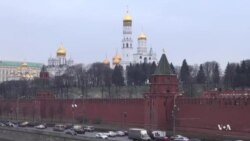MOSCOW —
Russian President Vladimir Putin's intervention in Ukraine may have raised the consternation of the West, but at home he remains popular and his economy is, so far, intact.
"Even if we, I were to make the decision to use force, it would be legitimate... And it is our interest and responsibility to defend those people closely related to us, historically, culturally and economically tied to us," said Putin during a press conference.
These views are largely shared by the population in Moscow. Natalya has relatives in Yevpatoria, a city in Crimea, a strategic military region being contested.
"All my friends, relatives, and neighbors there say that Crimea wants to be part of Russia," said Natalya.
Yevegeny, another Muscovite, shared Putin's views that the new Ukrainian government is illegitimate.
"Really it's an internal Ukrainian problem, but from a legal standpoint it's certainly an illegal change of powers," said Yevegeny.
Meanwhile, flowers outside the Ukrainian embassy symbolize the close ties between Russia and Ukraine, but they may also hint at solidarity with the ideals of the Ukrainians now in power.
Russian defense analyst Pavel Felgenhauer said opinions could change if life in Russia changes drastically under strict U.S. and EU sanctions.
"Russia is very much integrated into the international financial system. And sanctions will be very punishing if they are really serious sanctions," said Felgenhauer.
At Russia's stock market, the Moscow Exchange, Roman Sulzhyk said the conflict has only caused a predictable reaction with some investors selling off stocks.
"The way that Russian market and the exchange withstood the sell-off -- like we've seen some stocks drop by something like 20 percent. The main index drop by 10 percent. Obviously it's not pleasant to see this, but the way the Russian market withstood the sell-off, the trading continued, we've had really good volumes," said Sulzhyk.
Foreign investors own 40 percent of stock traded on the Moscow Exchange.
Putin sees economic sanctions by the West as a tit-for-tat game.
"In the modern world where everything is interconnected, and everybody depends on everybody one way or another, of course damage can be caused, but it will be mutual damage," said Putin.
Mutual damage seems the only clear inevitability for all parties involved.
"I don't think that Ukraine after reorganizing itself, after having legitimate elections, reorganizing its military will actually settle for part of the country being under Russian yoke. They're going to push back eventually. That means that this thing is going to continue and continue. Putin will be stubborn and the Ukrainians will be stubborn. And the West most likely will also have to be stubborn," said Felgenhauer.
Stubbornness and diplomacy do not go hand-in-hand. The G-8 meeting planned for Sochi is disintegrating, reports from Ukraine speak of volunteers lining up to fight and Putin has yet to reveal his weak spot.
"Even if we, I were to make the decision to use force, it would be legitimate... And it is our interest and responsibility to defend those people closely related to us, historically, culturally and economically tied to us," said Putin during a press conference.
These views are largely shared by the population in Moscow. Natalya has relatives in Yevpatoria, a city in Crimea, a strategic military region being contested.
"All my friends, relatives, and neighbors there say that Crimea wants to be part of Russia," said Natalya.
Yevegeny, another Muscovite, shared Putin's views that the new Ukrainian government is illegitimate.
"Really it's an internal Ukrainian problem, but from a legal standpoint it's certainly an illegal change of powers," said Yevegeny.
Meanwhile, flowers outside the Ukrainian embassy symbolize the close ties between Russia and Ukraine, but they may also hint at solidarity with the ideals of the Ukrainians now in power.
Russian defense analyst Pavel Felgenhauer said opinions could change if life in Russia changes drastically under strict U.S. and EU sanctions.
"Russia is very much integrated into the international financial system. And sanctions will be very punishing if they are really serious sanctions," said Felgenhauer.
At Russia's stock market, the Moscow Exchange, Roman Sulzhyk said the conflict has only caused a predictable reaction with some investors selling off stocks.
"The way that Russian market and the exchange withstood the sell-off -- like we've seen some stocks drop by something like 20 percent. The main index drop by 10 percent. Obviously it's not pleasant to see this, but the way the Russian market withstood the sell-off, the trading continued, we've had really good volumes," said Sulzhyk.
Foreign investors own 40 percent of stock traded on the Moscow Exchange.
Putin sees economic sanctions by the West as a tit-for-tat game.
"In the modern world where everything is interconnected, and everybody depends on everybody one way or another, of course damage can be caused, but it will be mutual damage," said Putin.
Mutual damage seems the only clear inevitability for all parties involved.
"I don't think that Ukraine after reorganizing itself, after having legitimate elections, reorganizing its military will actually settle for part of the country being under Russian yoke. They're going to push back eventually. That means that this thing is going to continue and continue. Putin will be stubborn and the Ukrainians will be stubborn. And the West most likely will also have to be stubborn," said Felgenhauer.
Stubbornness and diplomacy do not go hand-in-hand. The G-8 meeting planned for Sochi is disintegrating, reports from Ukraine speak of volunteers lining up to fight and Putin has yet to reveal his weak spot.





